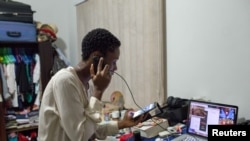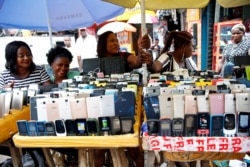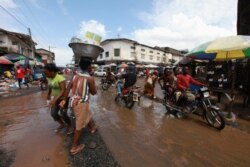As COVID-19 sweeps the globe, more and more people are relying on e-commerce to get what they need so they can practice social distancing. Businesses across West Africa are also seeing a boost in their online sales, though as experts say due to the digital divide, not everyone will have access.
Founder of Big Samps Market in Ghana, Elselund Ewudzie-Sampson has seen a drastic increase in demand since the pandemic. Her business does market shopping and delivery. However, she says she might soon have to stop her services.
“I think with the virus or the pandemic, people are getting scared to go to the market, so they are actually running to us, they are trusting us to provide the service to them. However, we are also thinking of going on a break because of that,” she said.
Stopping services would be bad for business, but she says she also needs to consider the health of her staff.
In Nigeria, online grocery shop Applecart is also experiencing more demand and new orders as buyers stock up on essentials to prepare for potential market closures or restriction of movement in the nation, the company says.
In Sierra Leone and Liberia, two nations smaller than Ghana and Nigeria, and less economically developed, online shops say they are experiencing slight increases in demand which they attribute to COVID-19 fears.
Liberian Fabunde Mamey started LIB Delivery in 2018. Motorbike riders deliver goods purchased from stores, meals from restaurants or packages across the capital Monrovia. He is seeing more people starting to use his service to stock up on goods, and to practice social distancing.
“It’s going to be a lot of people doing it because you need to avoid human interaction and so staying home and using LIB Delivery is basically the only option I can think of,” he said.
However, in these West African nations, not everyone can access these services. Most businesses spoken to said it is mostly middle-class people or ex-pats using their services.
Dennis Ndonga, a lecturer from Kenya, currently working in Australia has researched e-commerce in Africa and points to challenges in lack of internet connectivity, affordability and issues of cybercrime.
Ndonga says while e-commerce can help grow developing nation’s economy, digital divides need to be addressed. He says it is not only globally that there are inequalities in access to the internet. There are big gaps within developing nations as well.
“I think the pandemic will further expose the digital divide problem that exists between the major cities and the regional towns in the West African countries," he said. "Citizens who are required to self-isolate might have access to the internet and e-commerce services in the major cities while those in the regional towns might not have the same facilities.”
2017 estimates from the World Bank found that in Sub-Saharan Africa, only about 25% of the population uses the internet. So, increasing access would mean creating millions of job opportunities — like those in e-commerce.






